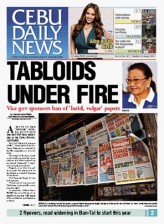
The “Anti-Tabloid Ordinance of 2011” introduced by Vice Gov. Agnes Magpale was referred to the PB committee on laws for study.
The target of the ban, based on the draft, are tabloids whose pictures and other content are considered “immoral,” “vulgar” and “sexually provocative.”
Magpale, in an interview, said she expects the measure to be challenged as a limit of freedom of expression.
“Let them challenge it,” she told reporters.
“Freedom of expression? That’s been so abused. It’s not an absolute right.”
As proposed, violators face a P5,000 fine or jail term of six months to one year with copies of the publication confiscated as evidence.
Magpale said she would invite publishers from Cebu and Manila to attend a public hearing on the ordinance, which will be called later.
She noted that tabloids without editorial staff boxes to hide the identifies of their owners were those that had “vulgar” content in almost every page and that most came from Manila.
“Law-ay (vulgar) is even an understatement,” she said of these papers.
She said her office conducted a survey that showed that tabloid sales was very high in rural areas of the province.
Since tabloids also carry news stories and other content, the question arose of whether the whole publication should be banned.
Magpale told reporters she was open to the idea of having only the objectionable parts removed.
“What is considered acceptable by the publisher during the public hearing, we’ll include it during the period of amendment,” she said.
“Tabloid” is the technical description of a small-format newsprint publication although it is often associated with the tradition of a mass market paper that uses sex, gossip and sensationalism to sell copies.
The tabloid size, also called “compact,” is used in community papers like Cebu Daily News, Sun.Star and The Freeman, as well as the International Herald Tribune and overseas editions of the Wall Street Journal, but Magpale was apparently not referring to these dailies.
In the draft ordinance, “tabloid” was defined as “a newspaper whose pages, usually five columns wide, are about one-half the size of a standard-sized newspaper page, and whose contents are luridly or vulgarly sensational”.
The proposed ordinance also covers “other similar printed reading materials” such as “magazines, books, brochures, leaflets or posters whether of local, national, or international coverage and circulation.”
Prohibited acts are stated as the sale, distribution, possession or exhibition of tabloids and other similar printed and reading materials containing immoral or indecent pictures, acts or writings with the Province of Cebu.
The need to refine the scope and definition of terms was pointed out by PB Member Ribomapil Holganza Jr.
He noted the “absence of a glossary of terms.” In a letter to the PB secretariat, he said this could lead to a subjective interpretation that could result in a violation of civil and human rights.
He said the picture of skimpily clad men or women on the front pages of some publications may be “abhorrent to some as it is eye candy to others.”
“And up to now it is an accepted marketing practice to boost local sales.”
“Furthermore, the passage of this ordinance will also draw more complications as to whether billboards and calendars that will feature similar images should also be banned,” he wrote.
He said there were implications in applying the same prohibition to the display of images in magazine covers, billboards and calendars.
“What are we to do with the real thing? Are we going to ban the wearing of bikinis and swim wear in our public beaches and private resorts? I need not mention the impact that this will have in our tourism campaign,” said Holganza, who chairs the PB committee on human rights.
In an interview, Magpale pointed to her office files of six tabloids, two of which were published in Cebu.
She said she was happy the Cebu City Anti-Indecency Board, which filed a complaint against SuperBalita and Freeman Banat for alleged violation of a city ordinance on “obscenity” for two Cebuano columns that ran a raunchy fiction series, was strictly monitoring local dailies.
Magapale said Cebu tabloids don’t always show sexy photos of women on the front page, but that images and serialized fiction stories printed in the inside pages were lewd.
While these tabloids also feature newsworthy stories, she said the lewd photos and stories affect the entire publication.
She said she encourages publishers to remove these sections if they don’t want their tabloids banned.
“When I prepare an ordinance, I ask lawyers and consultants. They act as devil’s advocates. They question. We’ve been warned,” she added.
PB Peter John Calderon, who heads the committee on laws, will review the draft ordinance before reporting it for second reading and setting a public hearing, then its final third reading.
Magpale said the Provincial Women’s Commission, where she is co-chairman, is aware of other “sexy” tabloids shipped from Manila and sold in local newsstands.
“We were told that some don’t have editorial boxes,” she said, to hide the identities of the entities publishing them.
Part of the rationale of the draft ordinance states that “an informal, random check lately” of printed reading materials circulated in Cebu showed that “some local and national tabloids” were featuring “lewd and pornographic contents, not suitable for public consumption especially to minors.” Carmel Loise Matus and Patricia Andrea Pateña Correspondents